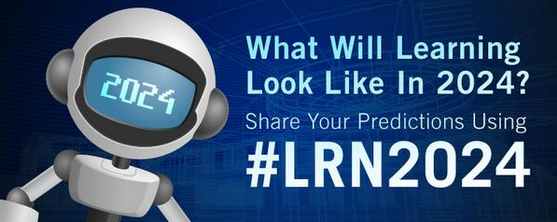ANSWER: The same …
Well, it’s not quite that simple. As a precursor to their #GuildChat series, the eLearning Guild hosted a Twitter chat about the (possible) future of learning last Friday (09/05/2014). David Kelly (programming/curation guru from the Guild) also challenged L&D folks to share their thoughts via other media (blog, comment, video, discussion, etc.) on his latest Twist post. While no one can accurately predict the future of our industry as a whole, exploring where current trends may take us makes for an interesting convo.
So, here’s a sample of my responses from the #LRN2024 Twitter chat along with some added explantation.
Q1) How has learning changed in the last 10 years (from the perspective of the learner)?
Information is officially ubiquitous – at least in the real world. At work – that’s still a challenge. Regardless, people can now access information when and where they wish. At the same time, actionable information is shared by everyone with means, desire, and opportunity. We don’t have to wait for a designated expert to speak the truth. Now, people can pick and choose their sources and validate content on their own terms. This access to the world’s knowledge directly impacts learning – as it has become less an event and more an ongoing, on-demand process driven by individual need.
Q2) What is the most significant change technology has made to organizational learning in the past decade?
To continue on the “information is everything” train, technology has enabled everyone to contribute without the requirement for formal authority. Wikis. Blogs. Social networks. Etc. Rather than go to a bookstore and sift through the few publications on a particular topic, I can search or (better yet) ask questions of my trusted network, who will guide me to suggested resources that I’m more likely to trust. While technology has changed everything about how we consume content during the past 10 years, I believe the SAVE button is the most important consideration for learning. It has shifted power to the user of information and democratized knowledge.
Q3) What are the most significant challenges facing organizational learning today?
We still seek control. Management must have the final say. We cannot release information that hasn’t been approved by the lawyers yet. Simply put – we can’t let go. Meanwhile, people find a way. They create backchannels and independent information networks. They have the same conversations they’ve always had, but now they do it faster and louder. Organizations must evolve by enabling their users to become contributors and facilitate the growth of sharing mentalities and behaviors. Likewise, L&D must evolve to focus on facilitating connections and curating contributions rather than acting as only a formal teaching resource.
Q4) What technologies will have the greatest impact on learning in the next decade? Why?
We can spot trends, but there’s no way we can identify details of technologies that likely haven’t even been conceived. After all, as I shared during the chat for context, look at what’s happened during the past 17 years:
- Google Search: 1997
- Wikipedia: 2001
- Facebook: 2004
- iPhone 1st Gen: 2007
- Google Glass: 2013
Technology is slowly (quickly) fading into the background. While we were once required to go to a specific room and sit at a computer to access information, we now carry it with us. As wearables evolve, we will focus less on applying technology – it will just happen. Where will that go? No clue. Regardless, it will have a direct impact on how people connect, consume, and share. That means it will change our world in L&D.
Q5) What new skills will professionals need to develop to support learning in the future?
Again, I cannot answer this one with confidence beyond saying we need to be flexible and maintain focus on evolving our skills to match needs and opportunity. This may include ideas like …
- Curation
- Data analysis
- Brain science
- Motivation
Ultimately, to provide value to any organization and individual performer, we need to be capable of identifying gaps, asking good questions, and facilitating improvement in ways that are meaningful.
Q6) What will learning look like in the year 2024?
As I said to start off, learning doesn’t change. The human mind works the way it works. My hope is that we come to better understand and appreciate that fact while finding new, more personalized ways to support the people with whom we work. Frankly, I don’t think you will have a dedicated “learning and development department” in 2024. I believe we must find ways to evolve our skills so that we can show value in multiple facets of the learning and performance ecosystem and redefine our own industry. If we stay locked to the training identity, people will simply use their own superior resources to render us extinct.
So what do you think? What will learning look like in 2024? More importantly, what will learning geeks like us be doing in 10 years to help people get better at what they do? Will they even need people like us at all?



